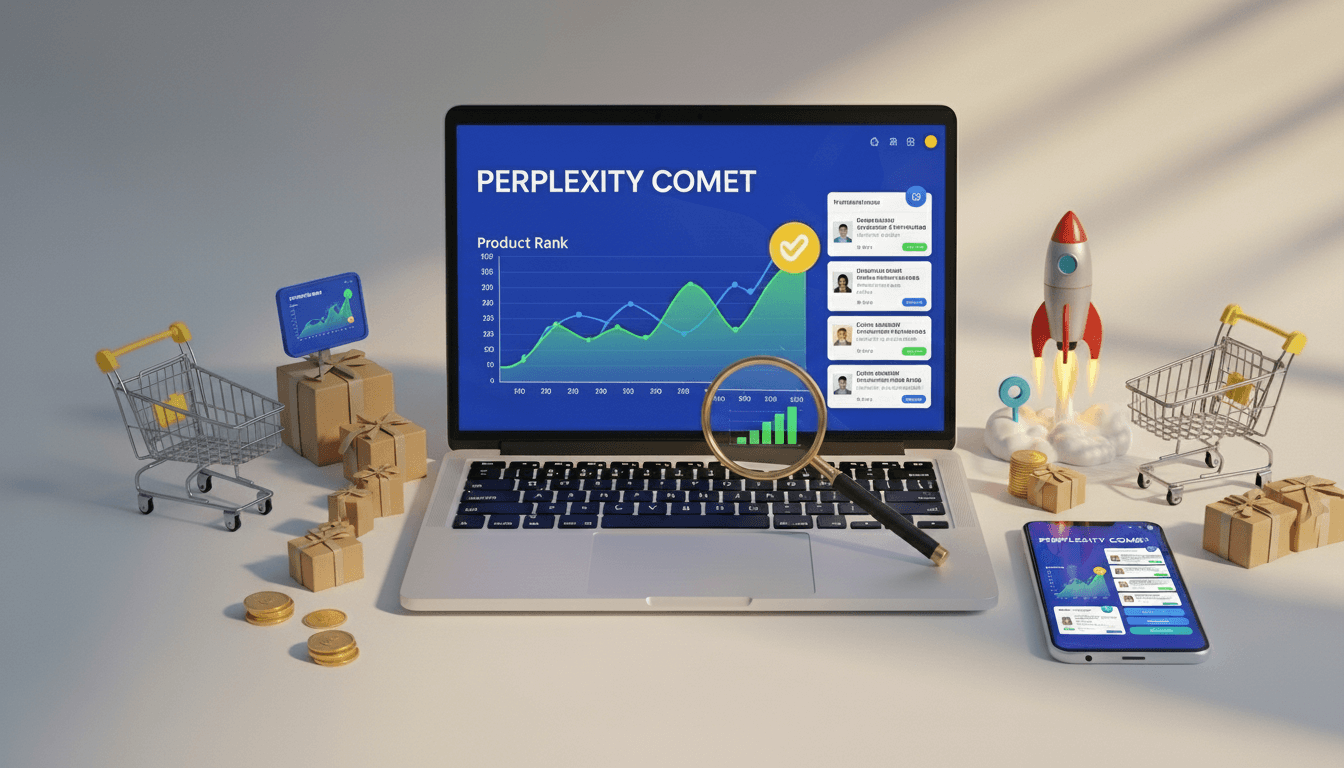AI SEO Strategies for E-commerce | Optimize Products for AI Shopping

Product discovery is getting smarter every day. What worked for e-commerce SEO five years ago doesn't cut it anymore.
Google's AI algorithms now understand shopping intent, product context, and the meaning behind queries like "best wireless headphones for travel"—not just keywords like "wireless headphones." This means your old product SEO playbook needs an update.
The good news? You can optimize products for AI with AI.
By using AI SEO strategies to optimize your product catalog, you can stay ahead of algorithm changes and dramatically improve product visibility. Over 86% of SEO professionals are already doing this for e-commerce, and they're seeing real results: higher product rankings, more AI recommendations, and increased sales from AI-referred traffic.
In this guide, we'll show you proven AI content optimization techniques specifically for online retailers that will boost your product SEO performance and help you get products discovered by AI shopping assistants.
What is AI SEO for E-commerce?
AI SEO for e-commerce is the practice of using artificial intelligence to enhance your product catalog optimization and store SEO efforts. Instead of just focusing on product keyword rankings, it's about creating product content that's more relevant, shopping-intent focused, and valuable to shoppers using AI assistants.
Think of it this way: while traditional product SEO was like optimizing for Google search results, AI SEO for e-commerce is optimizing for AI shopping recommendations ensuring your products appear when shoppers ask ChatGPT, Perplexity, or Google AI "What are the best [products] for [use case]?"
- Over 86% of SEO professionals are already using AI techniques for product optimization
- 65% of e-commerce businesses report that AI has improved their product SEO results
- 67% of shoppers now use AI assistants to research products before purchasing
- AI-referred shopping traffic converts 3.5x higher than traditional search traffic
Why AI SEO Matters for Online Retailers Now
Shopping engines like Google, ChatGPT, and Perplexity are getting smarter. They're using algorithms like RankBrain, BERT, and MUM to understand shopping context, purchase intent, and product meaning rather than just matching product keywords. This means your product content needs to be smarter too.
Here's what AI SEO brings to your online store:
Efficiency that scales product catalogs: AI can handle time-consuming tasks like product keyword research and catalog analysis, spotting product optimization opportunities human merchants might miss across thousands of products.
Faster product content creation: Generate product description ideas quickly, edit more effectively, and identify shopping queries that actually drive product sales.
Data-driven product insights: Get deeper analysis of shopping trends, shopper preferences, and product performance metrics than ever before.
Personalized shopping experiences: Create product recommendations based on individual shopper behavior, boosting engagement and conversions.
Better product discovery: Produce clearer, well-structured product content that shoppers actually want and AI platforms can understand and recommend.
If you're interested in E-commerce Generative Engine Optimization, you can find more about optimizing products for AI recommendations.
How AI-Powered Search Engines Work
AI-powered shopping platforms don't just match product keywords anymore. They use two key technologies to understand and recommend products:
Machine Learning for Products: These systems learn from shopping data and get better over time at understanding which products match specific shopper needs. They analyze patterns in purchase behavior and refine product recommendations continuously.
Natural Language Processing (NLP) for Shopping: This helps AI understand how shoppers actually ask for products, not just the technical product keywords they type. Examples:
- Best noise-cancelling headphones for long flights under $200
- Where to buy organic cotton baby clothes that are machine washable
- Standing desk for small apartment with back pain issues
The result? Shopping engines that prioritize product context, purchase intent, and shopping meaning over simple keyword matches. They analyze product sentiment in reviews, understand relationships between product features and shopper needs, and deliver more accurate product recommendations.
Check here for How LLMs work
What are the Essential AI SEO Strategies for E-commerce That Actually Work
1. Focus on Shopping Intent, Not Just Product Keywords
Stop thinking about what product keywords you want to rank for. Start thinking about what problems your customers are trying to solve with products.
AI shopping platforms are getting incredibly good at understanding the "why" behind a product search query.
When creating product content, ask yourself:
- What is the shopper really trying to accomplish with this product?
- What follow-up product questions might they have?
- How can I provide the most complete product answer?
- What use case is this product perfect for?
2. Create Product Content That AI Can Understand and Recommend
AI shopping systems love product content that's well-structured and easy to extract. This means:
Write clear, direct product answers: Start with what the product is and who it's for, then expand with details. Use factual tone without unnecessary promotional language.
E-commerce Example:
markdown
## SoundMax Pro Wireless Headphones
**Quick Product Answer (40-60 words):**
The SoundMax Pro wireless headphones deliver studio-quality noise cancellation, 30-hour battery life, and ergonomic comfort for under $150—perfect for frequent travelers, remote workers, and commuters who need all-day audio performance without breaking the bank.
**Who This Product Is For:**
- Frequent travelers who need reliable noise cancellation
- Remote workers in noisy environments
- Commuters with long daily travel times
- Budget-conscious audiophiles
**Key Features:**
- 30 hours continuous battery life
- Active noise cancellation (95% ambient reduction)
- Bluetooth 5.2 with 50ft range
- Foldable design with carrying case
- Compatible with all devicesStructure everything for AI understanding:
- Use numbered lists for product features
- Create bullet points for specifications
- Include clear product headings
- Add FAQ sections answering shopping questions
- Each section should make sense on its own
Answer unasked shopping questions: Include related questions and answers within your product content. This helps AI provide comprehensive product recommendations.
Product FAQ Examples:
- "Are these headphones comfortable for all-day wear?"
- "Do they work with both iPhone and Android?"
- "How does battery life compare to Sony WH-1000XM5?"
- "Can I use these on airplanes?"
Use the product cluster model: Create main product category pages that link to individual products and comparison guides.
E-commerce Product Cluster Example:
- Pillar Page: "Complete Wireless Headphones Buying Guide"
- Product Pages: Individual headphone models
- Comparison Pages: "Budget vs Premium Wireless Headphones"
- Use Case Pages: "Best Wireless Headphones for Travel"
3. Optimize for Featured Snippets and AI Product Recommendations
AI shopping systems often pull product content for featured snippets and direct product recommendations. To increase your chances:
Provide clear, concise product answers in 40-60 words:
Example: "The best standing desks for small spaces are under 48" wide with minimal footprints. Top compact options: Uplift V2 Corner Desk (46"W, $599), Fully Jarvis Bamboo Small (42"W, $489), and Vari Electric Standing Desk (48"W, $395) fit tight spaces without compromising stability."
Use question-and-answer formats for products:
- H2: "What are the best wireless headphones for travel?"
- Direct answer paragraph
- Detailed product recommendations
- Comparison table
Create product comparison tables and lists:
| Product | Battery Life | Noise Cancellation | Price | Best For |
|---|---|---|---|---|
| Sony WH-1000XM5 | 30 hours | Excellent | $399 | Premium quality |
| SoundMax Pro | 30 hours | Very Good | $149 | Best value |
| Bose QC 45 | 24 hours | Excellent | $329 | Comfort focus |
Start product paragraphs with direct statements:
"The SoundMax Pro offers the best value in wireless headphones under $200, combining 30-hour battery life with professional-grade noise cancellation."
4. Technical SEO for AI Shopping Crawlers
Make sure AI shopping systems can actually find and understand your products:
Speed matters more than ever for products:
- Product pages load in under 2 seconds
- Compress product images (WebP format)
- Cache product pages
- Choose hosting optimized for e-commerce speed
Mobile-first product design:
- AI algorithms heavily favor mobile-friendly product displays
- Responsive product images and descriptions
- Easy mobile add-to-cart functionality
- Fast mobile checkout
Allow AI shopping crawlers:
Update your robots.txt file to allow shopping crawlers:
# Allow AI shopping assistants to index products
User-agent: GPTBot
Allow: /products/
Allow: /collections/
Disallow: /cart/
User-agent: ClaudeBot
Allow: /products/
Allow: /collections/
User-agent: PerplexityBot
Allow: /products/
User-agent: OAI-SearchBot
Allow: /products/
User-agent: ChatGPT-User
Allow: /products/Use server-side rendering for critical product content.
Implement product schema markup:
This structured data helps AI understand what your products are about and improves chances of appearing in AI shopping recommendations.
json
{
"@context": "https://schema.org",
"@type": "Product",
"name": "SoundMax Pro Wireless Headphones",
"description": "Professional wireless headphones with 30-hour battery and active noise cancellation",
"image": "https://yourstore.com/products/soundmax-pro.jpg",
"brand": {
"@type": "Brand",
"name": "SoundMax"
},
"offers": {
"@type": "Offer",
"price": "149.99",
"priceCurrency": "USD",
"availability": "https://schema.org/InStock"
},
"aggregateRating": {
"@type": "AggregateRating",
"ratingValue": "4.7",
"reviewCount": "847"
}
}- Schema markup fully implemented
- Product Q&A included
- Clear 40–60-word product answer
- Structured specs + use cases
- AI-optimized product clusters
- AI crawler access enabled in robots.txt
5. Build Product Authority and Trust (E-E-A-T for E-commerce)
AI shopping systems are designed to surface trustworthy product sources. Focus on:
Experience with Products:
- Include customer reviews and testimonials
- Show real product usage scenarios
- Feature customer photos and videos
- Demonstrate products in actual use
Expertise in Your Category:
- Showcase product knowledge and testing
- Create comprehensive buying guides
- Provide detailed product comparisons
- Explain technical specifications clearly
Authoritativeness:
- Build product citations from review sites
- Earn backlinks from authority blogs in your niche
- Get products featured in "best of" lists
- Accumulate third-party product reviews
Trustworthiness:
- Display customer review counts prominently
- Show ratings and testimonials
- Include clear return and warranty policies
- Add trust badges (secure checkout, verified reviews)
- Maintain accurate pricing and availability
E-commerce Authority Signals AI Platforms Look For:
- 50+ customer reviews per product (minimum)
- 4.0+ average rating
- Recent reviews (within 6 months)
- Manufacturer certifications
- Industry awards
- Expert endorsements
- Sales volume indicators ("5,000+ sold")
6. Optimize for Voice and Conversational Shopping
With AI shopping assistants becoming more popular, optimize for how people actually ask for products:
Use conversational shopping keywords:
- "Where can I buy..."
- "What's the best [product] for..."
- "Show me [products] that..."
- "Find [product] with [feature]..."
Target long-tail shopping questions:
- "What are the best running shoes for flat feet?"
- "Where to buy organic baby clothes under $50?"
- "Which standing desk is best for small apartments?"
Include location-based terms for local shopping:
- "Free shipping in [region]"
- "Local pickup available"
- "Ships from [location]"
Common E-commerce AI SEO Challenges and How to Avoid Them
Algorithm volatility: AI shopping algorithms change fast and often without warning. Stay adaptable by focusing on shopper value and accurate product data rather than trying to game the system.
Product content quality issues: AI can help generate product descriptions quickly, but it needs human oversight. Always fact-check specifications, add real product experience, and ensure accuracy.
Over-optimization: Don't let AI tools suggest the same shopping keywords for multiple products. Create a product content map to avoid internal competition between similar products.
Losing your brand voice: AI tools are helpful for product descriptions, but they shouldn't replace your unique product expertise and store personality.
Outdated product information: AI shopping platforms penalize stores with inaccurate pricing, wrong availability, or outdated product specs. Keep product data fresh in real-time.
Manual optimization doesn't scale: You can manually optimize 50-100 products, but not 5,000. Use automation platforms like Answee for catalog-wide optimization
Answee automatically scans your entire product catalog, identifies ingredients/specs, structures your data for AI crawlers, and converts your products into AI-readable formats. This makes your store eligible for recommendations in ChatGPT, Perplexity, Google AI, and more.
The Future of AI SEO for E-commerce
Product discovery is becoming more personalized, contextual, and intelligent. We're moving toward:
Hyper-personalized product recommendations based on individual shopping behavior, past purchases, and preferences.
AI-generated product summaries that cite your store as the source (like Google's AI Overview shopping results).
Real-time product content that adapts based on current shopping trends and inventory.
Voice shopping dominance with "Alexa, order the best noise-cancelling headphones under $200" becoming standard.
Visual product search where shoppers snap a photo and AI finds similar products in your store.
Product authority recognition playing a bigger role in AI recommendation visibility.
The key is to stay focused on creating genuinely helpful product content while leveraging AI tools to do it more efficiently at scale.
How to Get Started with AI SEO
You don't need to overhaul your entire catalog at once. Start with these practical steps for E-commerce Answer Engine Optimization:
Week 1: Audit Your Current Product Content
- Audit top 20 products for AI-friendly structure and clear answers
- Test products in ChatGPT and Perplexity to see current visibility
- Identify shopping queries where you should appear but don't
- Document competitor products AI recommends instead of yours
Week 2: Technical Foundation
- Implement basic product schema markup on key products
- Configure robots.txt to allow AI shopping crawlers
- Optimize product page speed and mobile experience
- Fix broken product links and crawl errors
Week 3-4: Product Content Optimization
- Create comprehensive product descriptions with use cases
- Add product FAQ sections answering shopping questions
- Build product comparison tables
- Optimize product images with descriptive alt text
Month 2: Scale and Automate
- Use AI tools like ChatGPT for product description ideation
- Implement AI SEO tools for e-commerce like Answee for automated catalog optimization
- Build product category buying guides
- Create product cluster content structure
Month 3+: Monitor and Refine
- Monitor product visibility with AI platform tracking using Answee's AI checker tool
- Track which products AI platforms recommend most
- Analyze revenue from AI-referred shopping traffic
- Refine product content based on AI recommendation patterns
Critical for E-commerce: Use Answee for automated product catalog optimization across your entire Shopify or WooCommerce store. Manual optimization doesn't scale beyond 50-100 products.
Answee: E-commerce AI SEO Automation
What Answee Does for Product Optimization:
- One-click Shopify/WooCommerce/BigCommerce integration
- Automatic product data synchronization
- Real-time pricing and availability updates
- Optimizes products for ChatGPT, Google AI, Perplexity, Claude, Copilot simultaneously
- Platform-specific product content formatting
- Shopping query mapping to products
- Monitor which products AI platforms recommend
- Track shopping query coverage by product
- Competitive product visibility analysis
- Revenue attribution from AI-referred traffic
- Monitors GPTBot, ClaudeBot, PerplexityBot activity
- Real-time alerts for product indexing issues
- Crawler access optimization
- Manual optimization: 15-25 hours/week
- Answee automation: 1 hour/week oversight
- Scale: 5,000+ products vs. 50-100 manually
Remember, AI SEO for e-commerce isn't about replacing product expertise and merchant knowledge—it's about enhancing it at scale. The most successful strategies combine AI efficiency with human product insight, creating product content that's both technically optimized for AI and genuinely valuable to real shoppers.
The future of e-commerce SEO is here, and it's more focused on shopper value than ever before. By embracing AI tools while maintaining your commitment to product quality and authenticity, you'll be well-positioned to succeed in this new landscape.
Frequently Asked Questions About AI SEO
AI SEO for e-commerce combines artificial intelligence tools and strategies with traditional product SEO practices. It uses machine learning, natural language processing, and data analysis to optimize product catalogs, understand shopping intent, and get products recommended by AI-powered shopping platforms like ChatGPT, Perplexity, and Google AI Overview.
AI helps product SEO in several key ways: it automates product keyword research and catalog analysis, generates product description ideas based on shopping trends, analyzes shopper behavior patterns, optimizes product content for AI shopping recommendations, personalizes product discovery experiences, and helps predict which products AI platforms will recommend.
AI-generated product content can be effective for e-commerce SEO when used properly. However, it needs human oversight to ensure product specification accuracy, authentic product expertise, and brand voice alignment. Best practice: use AI for initial product description drafts, then enhance with real product experience and technical knowledge.
Search engines and AI shopping platforms don't automatically penalize AI-generated product content. Google's guidelines focus on product content quality, accuracy, and helpfulness rather than how it's created. The key is ensuring product descriptions are factually accurate, helpful to shoppers, and demonstrate real product expertise.
Traditional SEO focuses primarily on keyword optimization, backlinks, and technical factors. AI SEO expands this to include user intent understanding, semantic search optimization, content personalization, voice search optimization, and preparing for AI-powered search features like Google's SGE (Search Generative Experience).
Popular AI SEO tools include ChatGPT for content ideation and optimization, SurferSEO for content analysis, SEMrush for comprehensive SEO insights, Jasper for content creation, MarketMuse for content planning, and Frase for question-based content optimization.
Voice search requires optimizing for conversational queries and question-based keywords. People speak differently than they type, using longer, more natural phrases.
Featured snippets are concise answers that appear at the top of search results, often called "position zero." They're crucial for AI SEO because AI systems frequently pull information from these snippets to answer user queries. Optimizing for snippets increases your visibility in both traditional and AI-powered search results.
AI and search algorithms change rapidly, so review your strategy quarterly and make adjustments as needed. Monitor your content performance monthly, stay updated with algorithm changes, and continuously test new AI tools and techniques.
Answee reads your sitemap, product pages, ingredients/specs, and use cases, then restructures them into machine-readable formats that AI engines prefer. This increases the chances of your products being selected in AI shopping answers.





